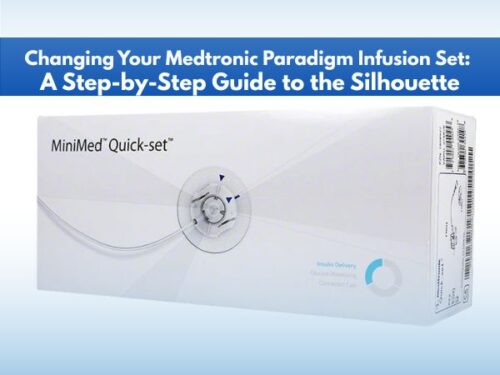Intermittent fasting – Pros and Cons

In Islam, Christianity, Judaism, and Buddhism, going without food and water is part of their religious practices. Emptying one’s stomach from food is also considered a way to fill the soul in Sufi practices. Despite being tough to implement, fasting has been followed by a large number of people. However, in recent times, a modified form of fasting has been introduced in the field of health and fitness which is called intermittent fasting.
Intermittent fasting is one of the latest trends in the domain of health and lifestyle which is often termed as ‘the science of going without’. It can be practiced in more than one way and is believed to have certain benefits associated with it. Let us take a look at the research-based evidence which has rendered intermittent fasting one of the ideal choices for people who want to lose weight or stay healthy.
What is intermittent fasting?
Intermittent fasting or IF is a time-based pattern of food consumption. In this practice, people eat for a specified time period and then skip any kind of calorie intake in the second half of the cycle. Moreover, in the period in which it is allowed to eat, the calorie intake is controlled based on the aim intended to be achieved by this method.
How is it done?
Intermittent fasting can be categorized in the following:
-
The 16:8 diet method
One can go for daily intermittent fasting in which you fast for 16 hours a day and then eat for 8 hours. This method of IF is known as the 16:8 method.
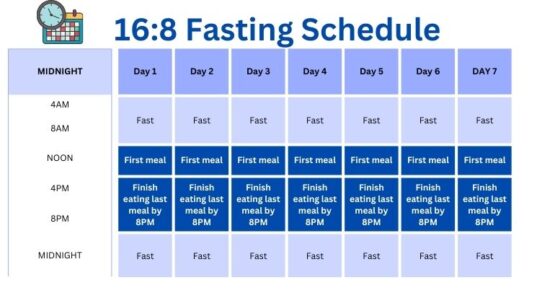
The 16:8 diet method
-
The Eat-Stop-Eat method
A twice-weekly cycle can also be adopted in which a person fasts for 24 hours two times a week, a method called the Eat-Stop-Eat method.
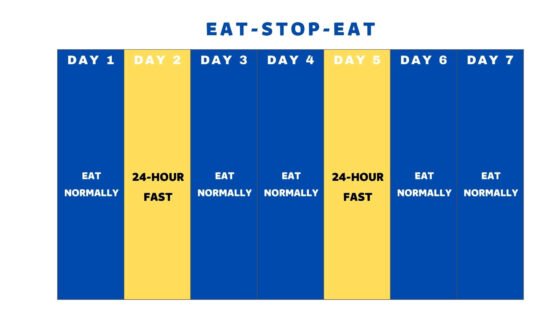
The eat-stop-eat diet method
-
The 5:2 diet method
In addition, another way of fasting is that the person has to restrict her or his calorie intake below 600 for two days a week while for the rest, normal food consumption is allowed. This is called the 5:2 diet method.
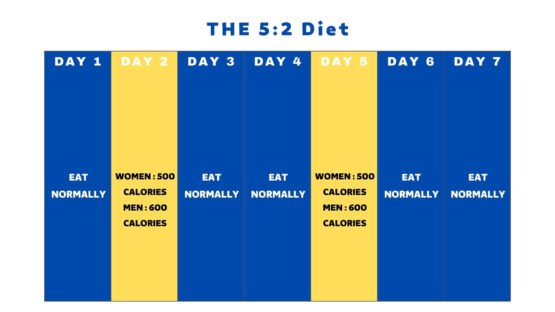
The 5:2 diet method
Benefits of intermittent fasting
People are attracted to intermittent fasting to achieve the following aims:
- Weight loss: While fasting, not only our body burns fat but also the levels of growth hormone elevate. This growth hormone further accelerates fat burning thus reducing body weight.
- Enhanced brain function: Devoiding the body of food for a longer period of time increases the mental efficiency of a person thus improving the brain functionality. However, this improvement is not only short-lived but has far-reaching positive effects on thinking and perception.
- Insulin resistance: Insulin resistance can be reduced by intermittent fasting. The studies have shown a 3 to 6% increase in the lowering of blood sugar levels in subjects who practice IF. Not only is intermittent fasting beneficial in diabetics but it also lowers the risk of getting diabetes in healthy subjects.
- Improved cardiac health: The IF can help reduce the levels of low-density lipoproteins or LDL, the bad cholesterol. In addition, the levels of triglycerides and inflammatory markers are also lowered. These factors positively affect the heart thus improving its overall health.
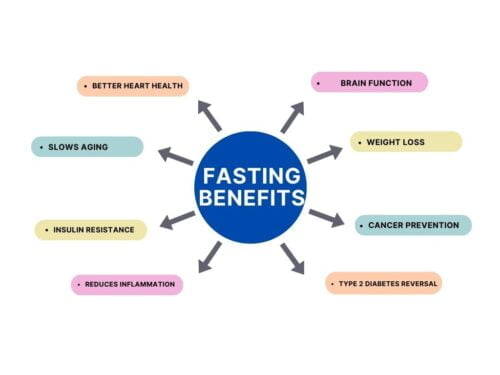
Benefits of intermittent fasting
- Brain health: Studies have indicated that in subjects who have been doing intermittent fasting for a longer time, the growth of newer neuronal cells can be observed. This is due to the elevated concentration of BDNF, a chemical agent responsible for neuronal development. Furthermore, the risk of Alzheimer’s disease is also reduced in subjects who practice IF.
- cancer: Research conducted on animal models has suggested that with regular intermittent fasting, the risk of cancer can be significantly reduced.
Side effects and risks of intermittent fasting
The side effects of intermittent fasting are usually minor and subside as your body grows used to it. These include:
- Headache
- Feeling hunger
- Insomnia
- Nausea
- Fatigue
Although intermittent fasting is a healthy practice, it is not for everyone. It has to be avoided in some conditions. Moreover, some of the benefits of intermittent fasting are gender-related i.e. women who do intermittent fasting regularly have reported amenorrhea or missed periods. Infertility, in some cases, can also be associated with eating very little.
Similarly, intermittent fasting is not for pregnant and breastfeeding women. In both of these conditions, the body needs extra calories which is a condition totally opposite to the one in intermittent fasting.
When to consult a physician?
If you have any of the following health conditions, it is important to consult your doctor before starting this diet trend:
- Diabetes
- Hypotension i.e. low blood pressure
- Less than normal BMI
- A history of eating disorders
- A history of amenorrhea
- Pregnancy
- Breastfeeding
- Trying to conceive
When to disconnect intermittent fasting?
If you are already doing intermittent fasting, the following are some of the signs that you need to discontinue it for some time and consult your doctor:
- Energy levels are always low
- Unexplained headache
- Pregnancy
- Amenorrhea
Conclusion
Intermittent fasting is the practice of going without food and water for a specified period of time. Research has claimed that the practice has several health benefits including improved brain function, gut and heart health, lowered risk of cancer, as well as decreased insulin resistance. However, it is not for everyone and it has its own side effects. If done with care and under personalized medical guidelines set by one’s physician, intermittent fasting is one of the best methods to lose weight and achieve physical and mental wellness.

















